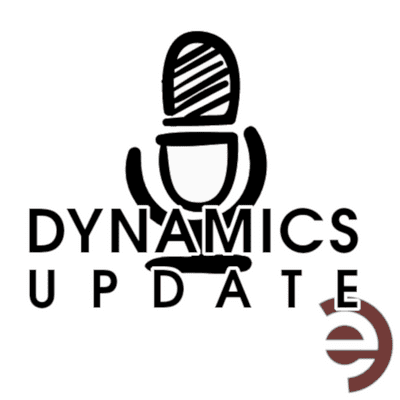
Dynamics Update
Podcast af dynamicsupdate
Begrænset tilbud
1 måned kun 9 kr.
Derefter 99 kr. / månedIngen binding.

Mere end 1 million lyttere
Du vil elske Podimo, og du er ikke alene
Rated 4.7 in the App Store
Læs mere Dynamics Update
Dynamics Update is a podcast with the main focus of summarizing Microsoft's monthly releases for Dynamics 365 for Finance and Operations and the One Version strategy. We blend that with some special episodes containing interviews and event coverage. Guiding you through the content is Gustav Sundblad and Johan Persson, Senior Specialists at Engage Group
Alle episoder
78 episoderDynamics Update: Dual Write Deep Dive with Max Sentchell Episode recorded in Portorož, Slovenia Johan and Gustav chat with Max Sentchell, a Microsoft Technical Architect who created the popular DW Helper tool out of frustration with manually configuring dual write mappings. His GitHub tool automates the painful process of setting up 80-90 mappings in the correct sequence across multiple environments. The conversation debunks a major misconception: dual write isn't broken, it just works differently than traditional integrations by syncing database fields directly. Most "dual write errors" actually originate in Finance & Operations or Dataverse, not the connector itself. The real challenge isn't technical though. Dual write projects fail when organizations treat them as mere technical implementations rather than fundamental workflow changes. CRM and ERP teams can no longer work in silos - they need unified processes, shared deployments, and coordinated database refreshes. Max's key insight: dual write exposes hidden master data quality issues, but the technology works reliably when teams collaborate properly from day one. The upcoming move to Power Platform Admin Center will make this unified approach more visible to customers.
The hosts welcomed Patrick Mouwen, a Netherlands-based solution architect with 15+ years in Dynamics, who's become the unofficial evangelist for one of Microsoft's most underutilized powerhouses: the Commerce Scale Unit (CSU). What started as a technical deep-dive quickly revealed why this caching layer might be the secret weapon your organization didn't know it needed. Patrick painted the CSU's evolution from humble beginnings—when Dynamics Commerce was just simple file transfers between POS systems and ERP—to today's sophisticated API-driven architecture. The CSU sits between your ERP and front-end applications, caching data in deployable regional instances that deliver lightning-fast responses for inventory lookups, pricing calculations, and order processing. It's the difference between customers seeing spinning wheels and instant results. The conversation took an interesting turn when Patrick shared his "wild guess" about the future: CSU expanding beyond commerce to become a universal API layer for all Dynamics data, potentially including Dataverse and third-party sources. He demonstrated this vision with a real example—showing how partners could skip building custom pricing services for Customer Engagement by simply tapping into CSU's pricing APIs that handle 98% of scenarios, including the new unified pricing engine. The biggest roadblock? Licensing. Patrick's AI-assisted cost analysis shows the per-order impact is surprisingly low, but there's no license option for companies wanting to use just a few APIs rather than full commerce functionality. Despite technical hurdles around documentation and the need for both functional and technical expertise, Patrick can typically implement a headless e-commerce solution using 20-25 key APIs in just five days. Resources mentioned: CSU documentation on GitHub, inventory visibility integration, unified pricing APIs, headless commerce architecture, Azure AI search capabilities.
In this episode, we sit down with Jared Hall, Principal Program Manager at Microsoft, who works on the core tools driving the next generation of business automation. We dive into how AI is being implemented in Dynamics 365 for Finance and Operations, and how Microsoft envisions the role of agents in an ERP context. 🔍 In this episode: * How AI agents are transforming Finance & Operations * Why trust is critical when deploying AI in financial systems * A look at six new preview agents for Finance & Operations, including a standout supplier communication agent that reads vendor emails and automatically processes supply chain changes * The game-changing Model Context Protocol server — now rolling out — which gives agents instant access to ERP business logic with just a few clicks /Gustav and Johan
In this episode, Johan and Gustav welcome Johanna, Head of AI and Analytics at Itera in Bergen, for an insightful discussion on Microsoft Fabric and the evolving world of data platforms. Johanna shares her expertise on how Microsoft Fabric represents a significant shift in data architecture by unifying multiple tools (Power BI, Synapse, Azure Data Factory) into a single platform. The conversation explores how this integration is democratizing data access, allowing business users rather than just IT specialists to work with enterprise data. The trio discusses the technical evolution from traditional SQL databases to modern Delta Lakes environments, noting that while the engineering aspects have become simpler, proper data governance remains essential. Johanna introduces the concept of "Full Stack Fabric Developers" who can now work across the entire data pipeline thanks to the platform's accessibility. They also touch on practical considerations when working with Dynamics 365 data through Fabric Link, addressing common questions about data refresh rates and the realities of near-real-time analytics in business environments. Gustav and Johan
Episode Summary Johan and Gustav interview Jinnie Wong - Principal Product Manager at Microsoft - about Business Performance Analytics (BPA) for Microsoft Dynamics 365, discussing its features and benefits for financial reporting. Jinnie gives us a brief introduction to BPA as a solution and she explains how BPA uses dimensional data modelling with strict star schema principles to make financial data more accessible and actionable. A major advantage of BPA is its inclusion in the Dynamics Finance license with Power BI licensing, eliminating the need for separate reporting tools. The process-oriented approach models data at the business process level rather than by module, making it more intuitive for accounting users. Gustav & Johan

Rated 4.7 in the App Store
Begrænset tilbud
1 måned kun 9 kr.
Derefter 99 kr. / månedIngen binding.
Eksklusive podcasts
Uden reklamer
Gratis podcasts
Lydbøger
20 timer / måned

































